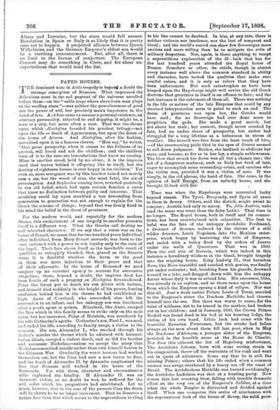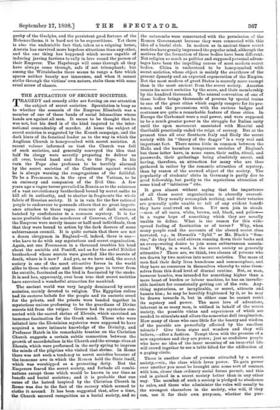FATED HOUSES.
THE dominant note in Attic tragedy is beyond a doubt the strange conception of Nemesis. What impressed the Athenians most in the sad pageant of the universe unrolled before them—on the "sable stage where slave-born man plays -to the scoffing stars "—was neither the powerlessness of good -nor the power of evil, but precisely man's impotence in the hand of fate. And fate came to assume a personal existence, an
• abstract personality, attached to and dogging, it might be, a man or a city, but more often a race. That was the theme upon which lEschylus founded his greatest trilogy,—not upon the life or death of Agamemnon, but upon the doom of the house of Atreus. And Aschylus, after his fashion, moralised upon it in a famous chorus. "Men say," he writes, " that great prosperity, when it comes to the fullness of its growth, will breed and not die childless ; and the children born of it to the race are lamentations that know no ceasing. Mine is another creed, held by me alone ; it is the impious deed that leaves behind it offspring like to itself, but the destiny of righteous homes is ever happy in its children." Yet even so, mere arrogance was by this teacher raised not merely into a sin, but the worst of sins, the most fatal, the sin of presumption. And Sophocles coming later, reverted positively to the old belief, which laid upon certain families a curse that knew no distinction between guilty and innocent. That misdoing could lay upon mankind a ban descending from generation to generation was not enough to explain for the -Greek the scheme of things; beyond that was firmly fixed in his mind the belief in the doom of greatness.
For the modern world, and especially for the modern -drama, this enchainment of one tragedy to another presents itself in a different way. What the Greeks call destiny we -call inherited character. If we say that a curse was on the house of Stuart, we mean that for two hundred years individual after individual, from Mary Stuart onwards, was born to the race endowed with a power to win loyalty only to the ruin of the loyal. Their fate shows itself as the inevitable result of qualities so unhappily blended, that, placed as the Stuarts were, it is doubtful whether the harm or the good in them was more injurious to their peace and that -of their adherents. In the house of Romanof we need conjure up no external agency to account for successive tragedies; there, beyond a doubt, the impious deed has been fertile of such a progeny as 2Eschylas foreshadowed. Peter the Great put to death his son Alexis with torture, and himself died suddenly in the height of his power, leaving confusion behind him in the throne he had established so high. Anne of Courland, who succeeded, also left the succession to an infant, and her unhappy son was butchered • after a youth spent in prison. Elizabeth, like Anne, escaped the fate which in this family seems to strike only on the male heirs, but her successor, Peter of Holstein, was murdered by his wife Catharine's agents. Catharine's son, Paul I., was mad, and ended his life, according to family usage, a victim to the assassin. His son, Alexander L, who reached through his father's murder the throne which he adorned with humani- tarian ideals, escaped a violent death, and so did his brother and successor Nicholas,—unless we accept the story that Nicholas committed suicide rather than own himself beaten in the Crimean War. Gradually the worst horrors had worked themselves out, but the Czar had now a new terror to face, and the death of Alexander II. by dynamite emphasised the fact that Nemesis still walked in the house of the Romanofs. Yet with them, character and circumstances alike explained the fatality. If Alexander II. was an innocent victim, as no doubt he was, he suffered for the evil order which his progenitors had established. Let us trust, however, that in the case of the present Czar the doom will be shown to be no longer immanent. That he deserves a better fate than that which seems to the superstitions to cling
to his line cannot be doubted. In him, at any rate, there is neither violence nor insolence, nor the lust of conquest and blood ; and the world's record can show few Sovereigns more anxious and more willing than he to mitigate the evils of military despotism. Nor, again, is there anything to tempt a superstitious explanation of the ill - luck that has for the last hundred years attended the Royal house of France. Somehow or other, its chiefs, though in almost every instance well above the common standard in ability and character, have lacked the qualities that make suc- cessful riders, and it is only as rulers that they have been unfortunate. But such catastrophes as have been heaped upon the Hapsburgs might well revive the old Greek doctrine that greatness in itself is an offence to fate; and the last instance is the extremest of them all. There was nothing in the life or nature of the late Empress that could by any strained interpretation seem to point to such an end. The doom of greatness was upon her, the Greeks would have said ; for no Sovereign had ever done more to propitiate the gods. She made a great match, but not above her rank ; her consort, though never crushed by fate, had no undue share of prosperity, but rather had struggled for a long lifetime as a helmsman in stress of weather. She herself was free from the least touch of Om, —of the overweening pride that in the eyes of Greece seemed to call down judgment. Rather, she inclined to abdicate her state, and become, so far as in her lay, a simple noblewoman. The blow that struck her down was all but a chance one; the act of a dangerous madman, such as Italy has bred of late, eager to accomplish some resounding crime, and careless who the victim was, provided it was a victim of note. It was simply, in the old phrase, the hand of fate. She came, in the opinion of half Euraie, from an unlucky house, and she brought ill-lack with her.
Time was when the Hapsburgs were accounted lucky beyond reason. The Tyrol, Burgundy, and Spain all came to them in dowry. Others, said the distich, might sweat to conquer; Austria had only to marry. Ta, felix Austria, nv,be (and the sense was truer than the false Latin). That time is no longer. The Royal house, both in itself and its connec- tions, has been overwhelmed with calamities. The first to befal was the fate of the unhappy Archduke Ferdinand, a dreamer of dreams, seduced by the visions of a still wilder dreamer, Louis Napoleon, into the Mexican enter- prise, which began by bestowing the title of Emperor, and ended with a volley fired by the orders of Juarez under the walls of Queretaro. That was in 1869. Then the evil star of Bavaria, which was indeed in this instance a hereditary wildness in the blood, brought tragedy into the reigning house. King Ludwig IL, that harmless Nero, like Nero beautiful and touched with genius, was finally put under restraint; but, breaking from his guards, drowned himself in a lake, and dragged down with him the unhappy doctor whose duty it was to attend him. His successor, Otto, was already in an asylum, and so there came upon the house from which the Empress sprang a kind of eclipse. Nor was this all. Just a week earlier Prince Louis of Trani, married to the Empress's sister the Duchess Mathilde, had thrown himself into the sea. Bat there was worse to come, for the taint of wildness, not to be traced in the mother, had broken out in her children; and in January, 1889, the Crown Prince Rudolf was found dead in his bed at his hunting lodge, the victim of his own hand. Little luck had come with the beautiful Bavarian Princesses, but the stroke had fallen always on the men about them till last year, when in May the Duchesse d'Alencon, a younger sister of the Empress, perished in the horrible scene at the Bazar de Ohara& Nor does this exhaust the list of Hapsburg misfortunes, The Archduke Johann, born with some roving strain in his composition, threw off the restraints of his rank and went out in quest of adventure. Some say that he is still the missing Prince; others that his life ended when a common seaman was swept overboard by a heavy sea off the coast of Brazil. The Archduchess Mathilde was burned accidentally; the Archduke Ladislaus was shot at a hunting party. Now comes this last crushing blow, falling with terrible dramatic effect on the very eve of the Emperor's Jubilee, at a time when the whole Empire is distracted and divided against itself. When one compares this series of mischances with the supernatural luck of the house of Savoy, the solid pros-
perity of the Guelphs, and the persistent good fortune of the Hohenzo Berns, it is hard not to be superstitious. Yet there is also the undeniable fact that, taken as a reigning house, Austria has survived more hopeless situations than any other, and the one thing has happened which seems capable of inducing jarring factions to rally in love round the person of their Emperor. The Hapsburgs will come through al they have always come through, safe if not triumphant; bat among the Wittelsbachs there seems to range a fate which spares neither beauty nor innocence, and when it cannot strike through the victims' own nature, stabs them with some cruel arrow of chance.



































 Previous page
Previous page